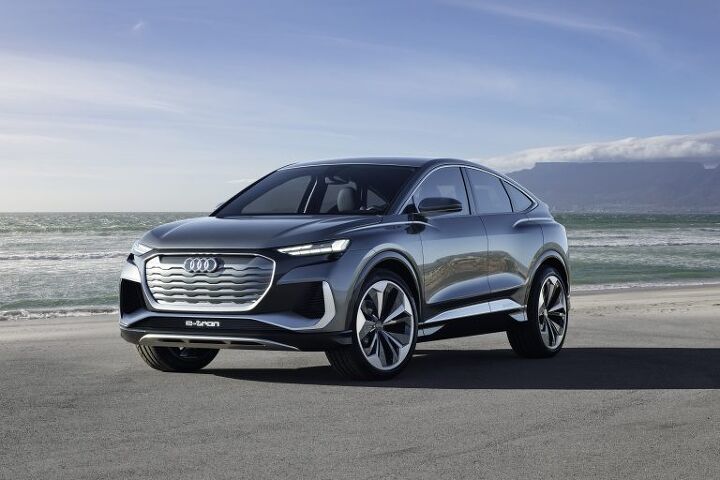#q4
Audi Debuts Q4 Sportback E-Tron Concept
Following the triumph that was Audi’s all-electric e-tron utility (the automaker doesn’t believe in uppercase letters), the brand developed a Sportback version for 2020 that sacrificed interior volume for a fastback roofline. The manufacturer describes it as “coiled yet poised, the stylized potential of the e-tron Sportback is clear from any angle — it’s designed to attract, electrify and generate envy of ownership,” making us cringe at the sheer magnitude of its pomposity. Based on the sales record of e-tron models, we may not be alone in feeling that way.
While plenty of outlets praised the model for its luxurious ride and upscale interior with lavish technical inclusions, we’ve come down hard on its production troubles and lackluster range. That’s likely the result of us mistakenly thinking cars should be broadly useful, especially SUVs and crossovers. But we’re also hyper-critical grumps and Audi also failed to deliver on the one item that set these cars apart from their internal combustion counterparts — the battery. Our hope was that the formula would be improved for the brand’s next EV, and that does seem to have happened.
Audi just debuted the Q4 Sportback e-tron Concept to complement the Q4 EV that appeared at the 2019 Geneva Motor Show.
Sales Roundup: Ram Beats Up On Chevy, Korean Brands Rake In Dough
Surprising exactly no one, Americans continue to snap up light trucks and SUV apace, driving manufacturers like Subaru to month-over-month gains in June. In fact, the Exploding Galaxy is continuing a remarkably torrid sales streak, chalking up 91 consecutive months of year-over-year growth. The beauty of all wheel drive, indeed.
That rumbling you hear are Chevrolet execs jumping over furniture to try and comprehend their sudden relegation to third place in the perpetual fight for pickup truck supremacy. Through to the end of June, Ram has trounced Silverado to the tune of about 50,000 units.
Ooooh; don’t you hate that burning smell?
GM Disappoints In The 4th Quarter
Analysts had already expected a disappointing 4th quarter, but when GM announced the results of the October – December quarter today, the results were worse than feared. Net income attributable to common shareholders was $500 million, or 28 cents a share. Analysts had expected two cents more.
Strong results in North America were dragged down by losses in Europe. Said GM CFO Dan Amman:


















Recent Comments